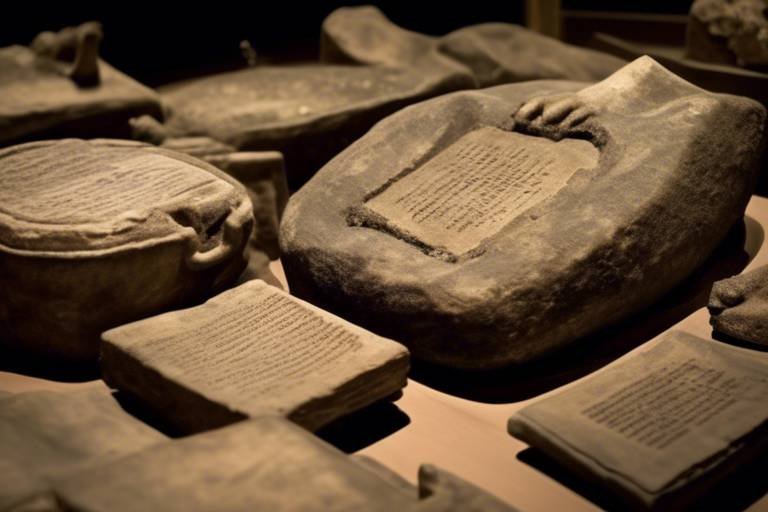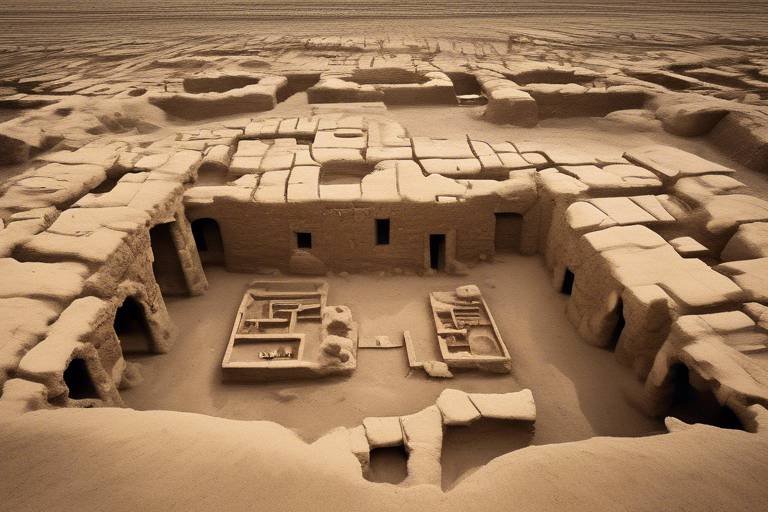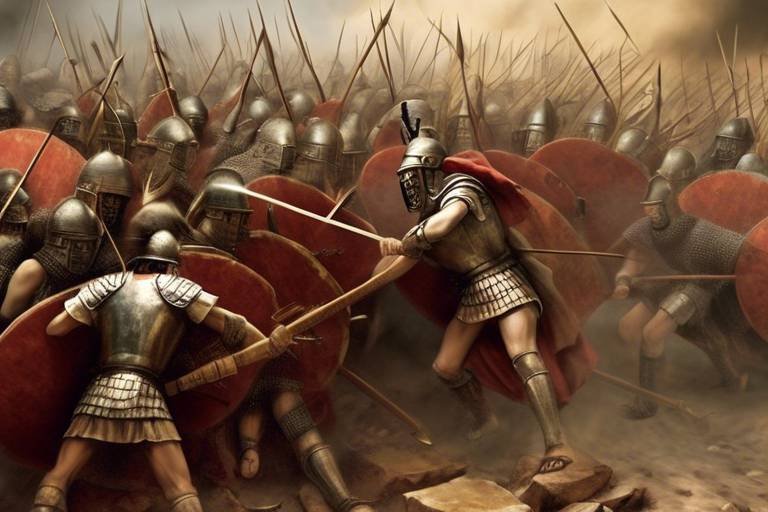The Challenges of Archaeological Work in War Zones
Archaeological work in war zones is a daunting task that comes with a myriad of challenges and obstacles. The very nature of conflict-ridden areas poses significant risks to both the safety of personnel and the preservation of invaluable historical artifacts. In the midst of chaos and destruction, archaeologists brave the uncertainties of war to uncover and protect our shared cultural heritage.

Security Concerns
When it comes to archaeological work in war zones, security concerns loom large over every aspect of the mission. The volatile nature of conflict-ridden regions poses significant risks to both the archaeologists on the ground and the precious artifacts they aim to protect. The threat of violence, looting, and damage to historical sites is ever-present, requiring meticulous planning and robust security measures to mitigate these dangers.
Archaeologists working in war zones must tread carefully, balancing the need to conduct their research with the imperative to ensure the safety of their team members. This delicate dance between exploration and protection demands a high level of vigilance and adaptability. The very essence of their work, the historical treasures buried beneath the rubble of war, is at stake, making security a top priority in every excavation and documentation effort.
Protecting valuable artifacts from looters and safeguarding the team from harm are intertwined challenges that demand creative solutions. From establishing secure perimeters around excavation sites to coordinating with local authorities and international organizations for added support, archaeologists must constantly innovate to stay one step ahead of potential threats.
Moreover, the risks extend beyond physical safety to the integrity of the archaeological record itself. The chaos and destruction of war can obliterate irreplaceable pieces of history in an instant, erasing vital clues to our collective past. The responsibility to preserve these artifacts for future generations weighs heavily on the shoulders of those brave enough to venture into these hazardous environments.

Preservation of Cultural Heritage
Amidst the chaos of war, preserving cultural heritage sites becomes a critical challenge. The destruction of historical artifacts not only erases the past but also impacts the identity and memory of affected communities. Archaeologists working in war zones face the daunting task of safeguarding these invaluable remnants of history from the ravages of conflict. The very essence of a society's identity and roots are intricately woven into these archaeological sites, making their preservation crucial for future generations to understand and appreciate the rich tapestry of human history.

Documentation and Data Collection
When it comes to archaeological work in war zones, the task of documentation and data collection is both crucial and challenging. In the midst of conflict and instability, archaeologists face the daunting mission of capturing valuable information before it is lost to the ravages of war. This process involves meticulous planning, strategic execution, and a deep commitment to preserving the historical record.
Archaeologists must employ a variety of techniques to document and collect data from sites under threat. This may include using advanced imaging technologies, such as drones and 3D scanning, to create detailed digital replicas of archaeological remains. Additionally, traditional methods like field surveys, excavation, and artifact analysis remain essential for gathering comprehensive data.
One of the key challenges in documentation and data collection is ensuring the accuracy and integrity of the information obtained. With the constant risk of site destruction or looting, archaeologists must work swiftly and efficiently to record as much detail as possible. This requires a high level of coordination among team members and a strong focus on prioritizing the most critical data.
Moreover, the documentation process extends beyond the fieldwork phase. Archaeologists must carefully catalog and analyze the collected data, creating comprehensive records that can withstand the test of time. This meticulous attention to detail is essential for future research, conservation efforts, and the preservation of cultural heritage.

International Collaboration
International collaboration plays a crucial role in the preservation of archaeological sites in war zones. By pooling resources, expertise, and technology, archaeologists from different countries can work together to protect valuable heritage from the ravages of conflict. This collaboration allows for the sharing of best practices, innovative approaches, and research findings, ultimately enhancing the collective effort to safeguard cultural treasures.
Moreover, international partnerships can facilitate diplomatic channels and advocacy efforts to raise awareness about the importance of preserving archaeological sites in war-affected regions. By engaging with governments, NGOs, and international bodies, archaeologists can amplify their voices and garner support for conservation initiatives amidst the chaos of conflict.

Ethical Considerations
Ethical dilemmas often arise when conducting archaeological work in war zones. The responsibility to local communities is a central concern, as the presence of archaeologists can impact the social fabric and relationships within these communities. It is crucial to engage with local stakeholders, including community leaders and residents, to ensure that their perspectives and needs are respected throughout the archaeological process.
Furthermore, the potential exploitation of cultural heritage for political gain is a significant ethical consideration. Archaeologists must navigate the delicate balance between preserving historical sites for the benefit of humanity and avoiding the instrumentalization of these sites for political or ideological purposes. Transparency in research objectives and findings is essential to maintain the integrity of archaeological work in conflict zones.
Another ethical challenge lies in the impact of research on conflict dynamics. Archaeological discoveries in war zones can sometimes fuel existing tensions or narratives, leading to further instability. Researchers must approach their work with sensitivity and awareness of the potential repercussions, striving to contribute positively to the understanding and resolution of conflicts rather than exacerbating them.
Ultimately, ethical considerations in archaeological work in war zones require a comprehensive approach that prioritizes the well-being of local communities, the integrity of research practices, and the promotion of peace and reconciliation. By upholding ethical standards and engaging in meaningful dialogue with all stakeholders, archaeologists can navigate the complexities of working in conflict-affected areas with integrity and respect.

Community Engagement
Community engagement plays a crucial role in conducting ethical archaeological work in war zones. By involving local communities in the research process, archaeologists can build trust, gain valuable insights from indigenous knowledge, and ensure the sustainability of conservation efforts. This engagement goes beyond mere consultation; it involves active participation and collaboration with community members, acknowledging their cultural connections to the heritage sites at risk.

Post-Conflict Reconstruction
Archaeological work in war zones can play a significant role in post-conflict reconstruction efforts. By uncovering and preserving historical sites, archaeologists contribute to rebuilding cultural identity and promoting peace and reconciliation. The remnants of the past serve as a foundation for the future, offering a tangible link to history that can unite communities torn apart by conflict. Through the careful excavation and documentation of archaeological sites, researchers not only piece together the narrative of a region's past but also provide a sense of continuity and resilience in the face of devastation.

Future Challenges and Opportunities
As conflicts continue to impact archaeological sites worldwide, addressing the challenges of working in war zones is paramount. The future of archaeological work in conflict zones presents both daunting challenges and exciting opportunities. Embracing innovative technologies is crucial for overcoming obstacles such as limited access to sites and security risks. By utilizing drones, satellite imagery, and 3D scanning, archaeologists can gather data remotely and protect personnel from danger.
Fostering international cooperation is another key aspect of the future of archaeological work in war zones. Collaboration between experts from different countries can bring diverse perspectives and resources to the table, enhancing the effectiveness of conservation efforts. By sharing knowledge and best practices, archaeologists can better navigate the complexities of working in high-risk environments.
Advocating for the protection of cultural heritage on a global scale is essential for safeguarding archaeological sites in war zones. Raising awareness about the importance of preserving historical artifacts can mobilize support from governments, organizations, and the public. By highlighting the significance of cultural heritage, archaeologists can garner the necessary resources and political will to ensure the survival of these irreplaceable treasures.
Frequently Asked Questions
- What safety measures are in place for archaeologists working in war zones?
Archaeologists working in war zones implement strict security protocols to ensure the safety of personnel. This includes coordination with local authorities, hiring security personnel, and establishing secure communication channels.
- How do archaeologists preserve valuable artifacts during conflicts?
Archaeologists employ various methods to protect artifacts, such as relocating them to secure facilities, creating digital backups of important data, and engaging in community outreach to raise awareness about the importance of cultural heritage preservation.
- What role does international collaboration play in archaeological work in war zones?
International collaboration is essential for sharing resources, expertise, and best practices in safeguarding archaeological sites. It enables archaeologists to access funding, technology, and support from a global network of professionals.
- How can archaeologists engage with local communities ethically?
Archaeologists engage with local communities by involving them in the research process, respecting their cultural heritage, and sharing the benefits of archaeological discoveries. Building trust and fostering mutual respect are key aspects of ethical community engagement.
- What are the future challenges and opportunities for archaeological work in conflict zones?
The future of archaeological work in conflict zones lies in embracing new technologies, advocating for policy changes to protect cultural heritage, and promoting international cooperation to address the challenges posed by ongoing conflicts.



















